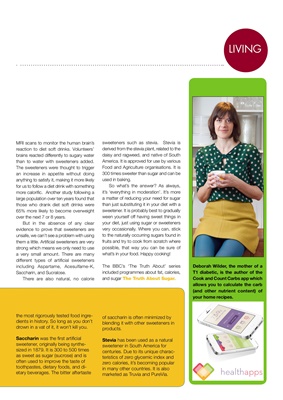
LIVING
Deborah Wilder, the mother of a
T1 diabetic, is the author of the
Cook and Count Carbs app which
allows you to calculate the carb
(and other nutrient content) of
your home recipes.
MRI scans to monitor the human brain's
reaction to diet soft drinks. Volunteers'
brains reacted differently to sugary water
than to water with sweeteners added.
The sweeteners were thought to trigger
an increase in appetite without doing
anything to satisfy it, making it more likely
for us to follow a diet drink with something
more calorific. Another study following a
large population over ten years found that
those who drank diet soft drinks were
65% more likely to become overweight
over the next 7 or 8 years.
But in the absence of any clear
evidence to prove that sweeteners are
unsafe, we can't see a problem with using
them a little. Artificial sweeteners are very
strong which means we only need to use
a very small amount. There are many
different types of artificial sweeteners
including Aspartame, Acesulfame-K,
Saccharin, and Sucralose.
There are also natural, no calorie
sweeteners such as stevia. Stevia is
derived from the stevia plant, related to the
daisy and ragweed, and native of South
America. It is approved for use by various
Food and Agriculture organisations. It is
300 times sweeter than sugar and can be
used in baking.
So what's the answer? As always,
it's 'everything in moderation'. It's more
a matter of reducing your need for sugar
than just substituting it in your diet with a
sweetener. It is probably best to gradually
ween yourself off having sweet things in
your diet, just using sugar or sweeteners
very occasionally. Where you can, stick
to the naturally occurring sugars found in
fruits and try to cook from scratch where
possible, that way you can be sure of
what's in your food. Happy cooking!
The BBC's 'The Truth About' series
included programmes about fat, calories,
and sugar The Truth About Sugar.
the most rigorously tested food ingredients in history.
So long as you don't
drown in a vat of it, it won't kill you.
Saccharin was the first artificial
sweetener, originally being synthesized in 1879. It is 300 to 500 times
as sweet as sugar (sucrose) and is
often used to improve the taste of
toothpastes, dietary foods, and dietary beverages. The bitter aftertaste
of saccharin is often minimized by
blending it with other sweeteners in
products.
Stevia has been used as a natural
sweetener in South America for
centuries. Due to its unique characteristics of zero
glycemic index and
zero calories, it's becoming popular
in many other countries. It is also
marketed as Truvia and PureVia.